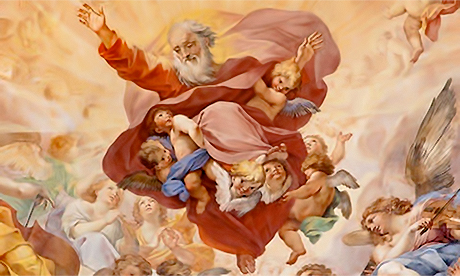The terms for God, in the poetic language of the prayers written for centuries, have almost always been male: Father. King. Lord.
And in the Episcopal Church, the language of prayer matters.
The Book of Common Prayer, the text used in every Episcopal congregation, is cherished as a core element of Episcopal identity.
This week, the church is debating whether to overhaul that prayer book — in large part to make clear that God doesn’t have a gender.
“As long as ‘men’ and ‘God’ are in the same category, our work toward equity will not just be incomplete. I honestly think it won’t matter in some ways,” said the Rev. Wil Gafney, a professor of the Hebrew Bible at Brite Divinity School in Texas who is on the committee recommending a change to the gendered language in the prayer book.
Gafney says that when she preaches, she sometimes changes the words of the Book of Common Prayer, even though Episcopal priests aren’t formally allowed to do so.
Sometime she switches a word like “King” to a gender-neutral term like “Ruler” or “Creator.”
Sometimes she uses “She” instead of “He.” Sometimes, she sticks with the masculine tradition.
”‘Our Father,’ I won’t fiddle with that,” she said, invoking the beginning of the Lord’s Prayer that Jesus taught his disciples to say in the book of Matthew.
Gafney and many other Episcopal priests don’t want to skirt the rules when they make changes like that — they want the prayer book to conform to a theology of God as bigger than gender.
The leaders of the Episcopal Church, the American denomination that descended from the Church of England but has long been separate from its British mother church, will consider two dueling resolutions at their triennial convention, which begins Tuesday in Austin and runs through next week.
One resolution calls for a major overhaul of the Book of Common Prayer, which was last revised in 1979.
A wholesale revision would take years, the church says, meaning a new prayer book wouldn’t be in use until 2030.
Switching to gender-neutral language is the most commonly mentioned reason to make the change, but many stakeholders in the church want other revisions.
There are advocates for adding language about a Christian’s duty to conserve the Earth; for adding a liturgical ceremony to celebrate a transgender person’s adoption of a new name; for adding same-sex marriage ceremonies to the liturgy, since the church has been performing such weddings for years; for updating the calendar of saints to include important figures named as saints since 1979. Continue reading
- Image: US Press From
News category: Features.




